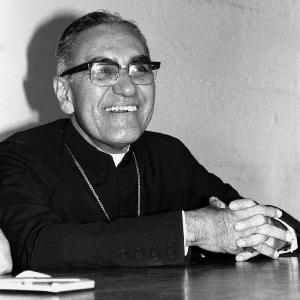
 N OCTOBER 14th, Óscar Romero will be canonized along with five others. His cause for canonization was opened in 1997 by Pope St. John Paul II. At a standstill for some years, it was furthered in 2012 by Pope Benedict XVI. On February 3, 2015, Pope Francis decreed that Romero was martyred in odium fidei (“in hatred of the faith”). Romero was then beatified in El Salvador on May 23, 2015.
N OCTOBER 14th, Óscar Romero will be canonized along with five others. His cause for canonization was opened in 1997 by Pope St. John Paul II. At a standstill for some years, it was furthered in 2012 by Pope Benedict XVI. On February 3, 2015, Pope Francis decreed that Romero was martyred in odium fidei (“in hatred of the faith”). Romero was then beatified in El Salvador on May 23, 2015.
In anticipation of Romero’s caconization, I was invited to speak with Dr. Jennifer Pascual, Director of Music for Saint Patrick’s Cathedral in New York City on “Sounds from the Spires” on SIRIUS XM 129 Radio, The Catholic Channel.
• PODCAST • Listen here to the program broadcast on 9.16.2018:
 N 2016 JENNIFER LESTER, Music Director of the The Seraphim Singers, was intent on commissioning from me a work to honor Óscar Romero. The result was music set to I Am the Land: A Poem in Memory of Óscar Romero by E. Ethelbert Miller (b. 1950).
N 2016 JENNIFER LESTER, Music Director of the The Seraphim Singers, was intent on commissioning from me a work to honor Óscar Romero. The result was music set to I Am the Land: A Poem in Memory of Óscar Romero by E. Ethelbert Miller (b. 1950).
The text of the poem is here and below.
A Spanish translation by Nancy Morejón can be found here.
Here is a recording of “I Am the Land: A Poem in Memory of Óscar Romero” a live performance by the Seraphim Singers in 2016:
Also featured on the program is my collection of chant-based organ works, Gregorian Impressions and Fearfully & Wonderfully Made for trumpet and organ.

E. Ethelbert Miller writes:
I Am The Land: A Poem In Memory of Oscar Romero was first published in my collection First Light: New and Selected Poems (Black Classic Press, 1994).
One of the major issues in our world today continues to be poverty. “The people of El Salvador are the people of the world.” This line should connect with everyone. I hope my poem also speaks to the role of the church in our society. The doors of this institution must always remain open, for pilgrims and strangers. Our faith must be made visible. I believe it begins with an open heart. Finally, the poem connects life to land. I wanted to link Óscar Romero to the grass, trees and wind. Even after Romero’s death, one should be able to open a window and inhale his beliefs and memory.
He who is resurrected is revolutionary.
He who is resurrected believes in peace.
This is the meaning of light.
This is the meaning of love.– E. Ethelbert Miller, March 14, 2017
From my own program notes: “…Romero’s message is a powerful voice crying out for the voiceless, the oppressed, and the slaughtered. Phrases in a modern harmonized Gregorian Chant style are in complete service of Miller’s text, and therefore Romero’s lifelong example of humble service towards justice and peace.”
I Am the Land: A Poem in Memory of Óscar Romero
I am the land.
I am the grass growing.
I am the trees.
I am the wind, the voice calling.
I am the poor.
I am the hungry.
The doors of the church are open
as wide as the heart of a man.
In times of trouble
here is a rock, here is a hand.
God knows the meaning of our prayers.
I have asked our government to listen.
God is not dead
and I will never die.
I am the land.
I am the grass growing.
I am the trees.
I am the wind, the voice calling.
I am the poor.
I am the hungry.
He who is resurrected is revolutionary.
He who is resurrected believes in peace.
This is the meaning of light.
This is the meaning of love.
The souls of my people are the pages of history.
The people of El Salvador are the people of the world.
I am Oscar Romero, a humble servant.
I am the land.
I am all the people who have no land.
I am the grass growing.
I am all the children who have been murdered.
I am the trees.
I am the priests, the nuns, the believers.
I am the wind, the voice calling.
I am the poets who will sing forever.
I am the poor.
I am the dreamer whose dreams overflow with hope.
I am the hungry.
I am the people.
I am Oscar Romero.
– E. Ethelbert Miller
